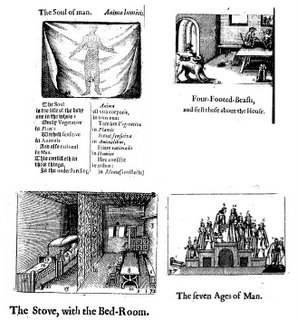

I have been clearing from my son’s room the books he has now outgrown – down to the Amnesty International bookshop with them all. Children (I was reminded while doing this) are still given encyclopedias when young, books that offer to tell them everything about the world before them.
Thinking about such books led me to Jan Amos Komensky, ‘Comenius’, the Czech pansophist and ‘Father of Education’. Between 1650 and 1654, working in Transylvania, he produced his enormously successful Orbus Sensualium Pictus, which appeared in English editions in 1659, 1664, 1685, 1689 and 1700 as: Joh. Amos Commenius's Visible world. Or, a picture and nomenclature of all the chief things that are in the world; and of mens employments therein. A work newly written by the author in Latine, and High-Dutch (being one of his last essays, and the most suitable to childrens capacities of any that he hath hitherto made) and translated into English, by Charles Hoole, M.A. for the use of young Latine scholars.
It is the first illustrated encyclopedia for children, simultaneously giving a huge push to their Latin vocabulary. It sets off with a bizarre alphabet, in which every letter is alleged to be pronounced by a suitable animal. Thus fired to surpass the mere animal kingdom, the child is led into the word clusters and basic concepts associated with God, The World, Heaven, Fire, Air, Water, and onwards to the things in the earth: its fruits, metals, gems, flowers, animals, and then into the human world, with its life stages, trades, activities, amusements. It is strictly Eurocentric, with one brisk account of Mohammadism. The ‘visible world’ notion does not stop the book from discussing moral concepts.
And every page is illustrated, with a woodcut, many of them highly engaging. I imagine that the text was tinkered with in transmission. Comenius advocated such advanced notions as universal education (both sexes equally, and for all abilities), minimal rote learning, and regarded corporal punishment in schools as inevitably counter-productive. When the Orbuscomes to describing all aspects of a school, it is in a section which must have been adapted to local and normal conditions during the book’s progression across Europe: “Some talk together, and behave themselves wantonly, and carelessly; these are chastised with a Ferrula and a Rod’ (concludes section XCVII).
This link below is to an essay on Comenius which I recommend: it is rather moving to hear of such amazingly advanced notions being put forward by a man whose life was one of harrowing sequential exile and loss. No wonder the Czechs are proud of him: http://www.ibe.unesco.org/publications/ThinkersPdf/comeniuse.PDF
I have put together in a single image the intriguing way the woodcut artist chose to depict the soul; the seven ages of man (and woman); the picture of domestic pets (“The Dormouse and other greater Mice, as the Weesel, The Martin and the Ferret, trouble the house” explains the text); and a depiction of a domestic amenity I did not know early modern Europe had, the ‘Stove’ room, designed to be warm and cosy. It is depicted adjacent to a bedroom, complete with chamber pot. I doubt many 17th century children needed to be told its function (“A chamber pot is for making water in”), but the Latin word ‘Matula’ can’t have cropped up that often.
Alongside, I’ve put most of the double page about marriage, as a specimen, and because it appealed to me (“After this they are called Husband and Wife; when she is dead, he becometh a widower”).
Supposing Comenius’s project had triumphed… He was a Bishop in the Moravian Brethren, a Christian Church that did NOT teach that only its adherents were the saved. Suppose Comenius had managed to teach such tolerance, alongside the vital importance of a universal education based always on practice and encouragement. Suppose his vision of Europe as a Utopia had somehow taken hold...



3 comments:
Dear Laura O, In the first place it's always nice to hear that someone is actually reading the blog! I'm sorry if Blogger makes it tiresome to comment, though I guess I am rather stuck with the rather restricted parameters it offers. I had to put on comment moderation too, after the advertising 'comments' started to come in. I can be e-mailed off the profile page, btw, and so serve as another route for comments, for I'd put constructive remarks up myself from any e-mails. Roy.
Ah, Comenius. I think that's the first time I've seen him mentioned on a blog. I have a nice copy of the Orbus at home, a modern 16mo, and also a rare paperback of the Panglottia. Marvelous stuff, of course.
I had never thought to check if modern editions had ever been available. In Czechoslovakia, I can well imagine that he has a print presence still. They sound like pleasing texts to possess.
Post a Comment